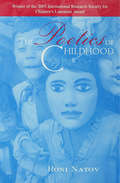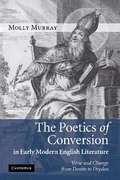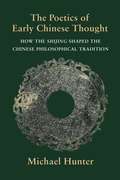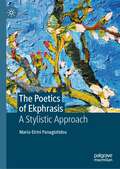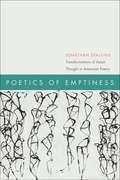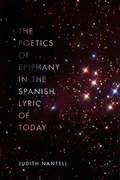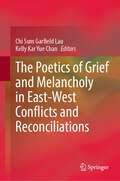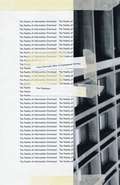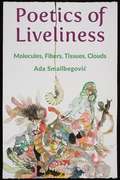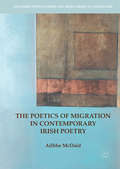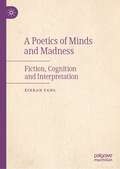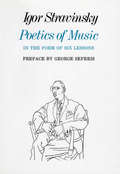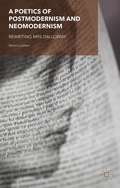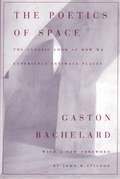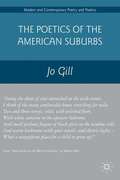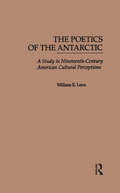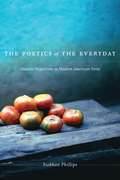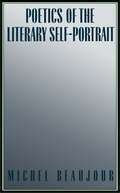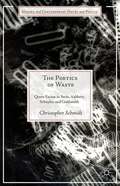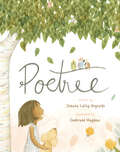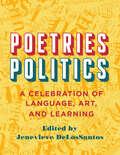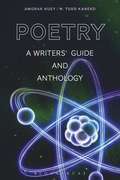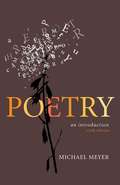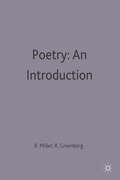- Table View
- List View
The Poetics of Childhood (Children's Literature And Culture Ser.)
by Roni NatovChildren's literature provides a medium through which writers re-create or approximate the sensibility of a child. But what exactly is this sensibility, and how does it find creative expression in adulthood? What language can portray the seemingly untranslatable experience of a child?The Poetics of Childhood, winner of the 2005 International Resear
The Poetics of Conversion in Early Modern English Literature
by Molly MurrayChristians in post-Reformation England inhabited a culture of conversion. Required to choose among rival forms of worship, many would cross - and often recross - the boundary between Protestantism and Catholicism. This study considers the poetry written by such converts, from the reign of Elizabeth I to that of James II, concentrating on four figures: John Donne, William Alabaster, Richard Crashaw, and John Dryden. Murray offers a context for each poet's conversion within the era's polemical and controversial literature. She also elaborates on the formal features of the poems themselves, demonstrating how the language of poetry could express both spiritual and ecclesiastical change with particular vividness and power. Proposing conversion as a catalyst for some of the most innovative devotional poetry of the period, both canonical and uncanonical, this study will be of interest to all specialists in early modern English literature.
The Poetics of Early Chinese Thought: How the Shijing Shaped the Chinese Philosophical Tradition
by Michael HunterThe modern imagination of classical Chinese thought has long been dominated by Confucius, Mozi, Mencius, and other so-called “Masters” of the Warring States period. Michael Hunter argues that this approach neglects the far more central role of poetry, and the Shijing (Classic of Poetry) in particular, in the formation of the philosophical tradition. Through a new reading of its ideology and poetics, Hunter reestablishes the Shijing as a work of major intellectual-historical significance. The Poetics of Early Chinese Thought demonstrates how Shi poetry weaves a vision of society united at every level by the innate and universal impulse to come home. The Shi immersed early thinkers in a world of movement and flow in order to teach them that the most powerful current of all was the gravitational pull of a virtuous king, without whom people can never truly feel at home. Hunter traces the profound influence of the Shi ideology across numerous sources of classical Chinese thought, which he recasts as a network centered on the Shi. Reframing the tradition in this way reveals how poetry shaped ancient Chinese thinkers’ conception of the world and their place within it.This book offers both a sweeping critique of how classical Chinese thought is commonly understood and a powerful new way of studying it.
The Poetics of Ekphrasis: A Stylistic Approach
by Maria-Eirini PanagiotidouThis book provides a stylistic and cognitive poetic account of ekphrastic poetry (poetry whose subject matter is predominantly artworks and images), examining the linguistic processes through which works of art can become literary objects. The author sheds light on the workings of ekphrasis at a textual level, while also considering the cognitive and psychological effects of reading ekphrastic poems, developing cognitive and stylistic analytical frameworks grounded on the four principles that govern ekphrasis: representation, narrativization, transposition, and collaboration. This book will be of interest to academics and practitioners in various fields, including literary critics, art critics, rhetoricians, poets, visual artists, and stylisticians.
Poetics of Emptiness
by Jonathan StallingThe Poetics of Emptiness uncovers an important untold history by tracing the historically specific, intertextual pathways of a single, if polyvalent, philosophical term, emptiness, as it is transformed within twentieth-century American poetry and poetics. This conceptual migration is detailed in two sections. The first focuses on transpacific Buddhist poetics, while the second maps the less well-known terrain of transpacific Daoist poetics. In Chapters 1 and 2, the author explores Ernest Fenollosa's The Chinese Written Character as a Medium for Poetryas an expression of Fenollosa's distinctly Buddhist poetics informed by a two-decade-long encounter with a culturally hybrid form of Buddhism known as Shin Bukkyo (New Buddhism). Chapter 2 explores the classical Chinese poetics that undergirds the lost half of Fenellosa's essay. Chapter 3 concludes the first half of the book with an exploration of the didactic and soteriological function of emptinessin Gary Snyder's influential poetry and poetics. The second half begins with a critical exploration of the three-decades-long career of the poet/translator/critic Wai-lim Yip, whose transpacific Daoist poeticshas been an important fixture in American poetic late modernism and has begun to gain wider notoriety in China. The last chapter engages the intertextual weave of poststructural thought and Daoist and shamanistic discourses in Theresa Hak Kyung Cha's important body of heterocultural productions. By formulating interpretive frames as hybrid as the texts being read, this book makes available one of the most important yet still largely unknown stories of American poetry and poetics
The Poetics of Epiphany in the Spanish Lyric of Today
by Judith NantellDrawing on the poetry of four major voices in the Spanish lyric of today, Judith Nantell explores the epistemic works of Luis Muñoz, Abraham Gragera, Josep M. Rodríguez, and Ada Salas, arguing that, for them, the poem is the fundamental means of exploring the nature of both knowledge and poetry. In this first interpretive analysis of the epistemic nature of their poetry, Nantell innovatively engages these poets, each of whom has contributed one of their own poems along with a previously unpublished explication of their chosen poem. Each also provides an original biographical sketch to support Nantell’s development of a poetics of epiphany.
The Poetics of Grief and Melancholy in East-West Conflicts and Reconciliations
by Chi Sum Garfield Lau Kelly Kar Yue ChanThis book is a collection of academic essays that examines the representation, esthetics and dichotomy of the notions of grief and melancholy in East–West exchanges and cultural dialogues. It explores the topic in the dimensions of individual behaviors under specific social norms and cultural products such as literature, film and any other forms of arts/genres, etc.In his 1917 work Mourning and Melancholia (Trauer und Melancholie), Sigmund Freud connected the grief of loss with melancholic emotions which may give rise to acts of mourning. He suggested that “[i]n mourning it is the world which has become poor and empty; in melancholia it is the ego itself” (Freud, 1917: 246). Inspired by Freud’s stance and with the goal of providing up-to-date intellectual resources for academics, researchers and students with ardent interests in the varying exemplifications of grief and melancholy in Sino-Western contexts, the book serves more than a discussion over the pragmatic and ritualistic connections of grief and melancholy in relation to the inner self and the external world. It aims at the pursuit of a contemporary theorization of grief and melancholy beyond its modern limits.
The Poetics of Information Overload
by Paul StephensInformation overload is a subject of vital, ubiquitous concern in our time. The Poetics of Information Overload reveals a fascinating genealogy of information saturation through the literary lens of American modernism. Although technology has typically been viewed as hostile or foreign to poetry, Paul Stephens outlines a countertradition within twentieth- and twenty-first-century literature in which avant-garde poets are centrally involved with technologies of communication, data storage, and bureaucratic control. Beginning with Gertrude Stein and Bob Brown, Stephens explores how writers have been preoccupied with the effects of new media since the advent of modernism. He continues with the postwar writing of Charles Olson, John Cage, Bern Porter, Hannah Weiner, Bernadette Mayer, Lyn Hejinian, and Bruce Andrews, and concludes with a discussion of conceptual writing produced in the past decade.By reading these works in the context of information systems, Stephens shows how the poetry of the past century has had, as a primary focus, the role of data in human life.
Poetics of Liveliness: Molecules, Fibers, Tissues, Clouds
by Ada SmailbegovićCan poetry act as an aesthetic amplification device, akin to a microscope, through which we can sense minute or nearly imperceptible phenomena such as the folding of molecules into their three-dimensional shapes, the transformations that make up the life cycle of a silkworm, or the vaporous movements that constitute the ever-shifting edges of clouds? We tend to think of these subjects as reserved for science, but, as Ada Smailbegović argues, twentieth- and twenty-first-century writers have intermingled scientific methodologies with poetic form to reveal unfolding processes of change. Their works can be envisioned as laboratories within which the methodologies of experimentation, natural historical description, and taxonomic classification allow poetic language to register the rhythms and durations of material transformation.Poetics of Liveliness moves across scales to explore the realms of molecules, fibers, tissues, and clouds. It investigates works such as Christian Bök’s insertion of a poetic text into the DNA code of living bacteria in order to generate a new poem in the shape of a protein molecule, Jen Bervin’s considerations of silk fibers and their use in biomedicine, Gertrude Stein’s examination of brain tissues in medical school and its subsequent influence on her literary taxonomies of character, and Lisa Robertson’s studies of nineteenth-century meteorology and the soft architecture of clouds. In their attempt to understand physical processes unfolding within lively material worlds, Smailbegović contends, these poets have developed a distinctive materialist poetics. Structured as a poetic cosmology akin to Lucretius’s “On the Nature of Things,” which begins at the atomic level and expands out to the vastness of the universe, Poetics of Liveliness provides an innovative and surprising vision of the relationship between science and poetry.
The Poetics of Migration in Contemporary Irish Poetry
by Ailbhe McDaidThis book offers fresh critical interpretation of two of the central tenets of Irish culture - migration and memory. From its starting point with the 'New Irish' generation of poets in the United States during the 1980s and concluding with the technological innovations of 21st-century poetry, this study spans continents, generations, genders and sexualities to reconsider the role of memory and of migration in the work of a range of contemporary Irish poets. Combining sensitive close readings and textual analysis with thorough theoretical application, it sets out the formal, thematic, socio-cultural and literary contexts of migration as an essential aspect of Irish literature. This book is essential reading for literary critics, academics, cultural commentators and students with an interest in contemporary poetry, Irish studies, diaspora studies and memory studies.
A Poetics of Minds and Madness: Fiction, Cognition and Interpretation
by XINRAN YANGThis monograph aims to explore the mind-narrative nexus by conducting a cognitive narratological study on the mad minds in fictional narratives. Set on the interface of narrative and cognitive science (cognitive linguistics, cognitive psychology and cognitive neuropsychology), it adopts an indirect empirical approach to the fictional representation of madness. The American writer Ken Kesey’s novel One Flew Over the Cuckoo’s Nest is chosen as the primary text of investigation, whereas due consideration is also given to other madness narratives when necessary. This book not only demonstrates the value of reading and rereading literary classics in the modern era, but also sheds light on the studies of cognitive narratology, cognitive poetics, madness narratives and literature in general.
Poetics of Music
by Igor Stravinsky Arthur Knodel Ingolf DahlThese lessons provide penetrating glimpses into the thought processes of Stravinsky's mind. While dealing with his chosen topics-the phenomenon of music, the composition of music, musical typology, the avatars of Russian music, and the performance of music-he reveals his reverence for tradition, order and discipline. He believes 'the more art is controlled, limited, worked over, the more it is free. His opinions about Wagner, Verdi, Berlioz, Hindemith, Weber, Beethoven, Glinka, Tchaikovsky, Moussorgsky and Bach are refreshing. He also analyzes the function of the critic, the requirements of the interpreter, the state of Russian music, and musical taste and snobbery." - The American Recorder Once again the concertgoer and music lover can take pleasure in Igor Stravinsky's thoughts on the essentials of music. It was over thirty years ago that Stravinsky delivered the Charles Eliot Norton Lectures at Harvard University on which the French-language edition of this book and later the English translation by Arthur Knodel and Ingolf Dahl were based. Now his Poetics of Music is available in paper-with a preface by George Seferis.
A Poetics of Postmodernism and Neomodernism
by Monica LathamVirginia Woolf's Mrs Dalloway, one of the most significant modernist texts from the Western literary canon, has spawned numerous contemporary offspring. Contemporary authors have dialogued with it, challenged it, reinvented it and offered creative responses to it, thus reinforcing its accumulated critical reputation and canonical status. After meticulously tracing the genesis of Woolf's most iconic novel so as to examine the production of Woolf's idiosyncratic Dalloway-esque signature, A Poetics of Postmodernism and Neomodernism sets out to explore its reproduction by a variety of postmodernist and neomodernist Anglo-American writers who are either openly indebted to Woolf's novel or covertly influenced by it. The contemporary tributes that are indebted to Mrs Dalloway in so many ways have rejuvenated the Woolfian novel and have propelled it into the twenty-first century. Almost a hundred years after its publication, Woolf's Mrs Dalloway has proved to be an enduring text, an 'ice-breaking vessel' which continues to invite 'individual talents' to follow in its wake.
The Poetics of Space
by Gaston Bachelard John R. StilgoeThirty years since its first publication in English, French philosopher Gaston Bachelard's The Poetics of Space one of the most appealing and lyrical explorations of home. Bachelard takes us on a journey, from cellar to attic, to show how our perceptions of houses and other shelters shape our thoughts, memories, and dreams.
The Poetics of the American Suburbs
by Jo GillThe first scholarly study of the rich body of poetry that emerged from the post-war American suburbs, Gill evaluates the work of forty poets, including Anne Sexton, Langston Hughes, and John Updike. Combining textual analysis and archival research, this book offers a new perspective on the field of twentieth-century American literature.
The Poetics of the Antarctic: A Study in Nineteenth-Century American Cultural Perceptions (Studies In Nineteenth-century American Literature #Vol. 5)
by William E. LenzThe thesis of this book is that the 19th-century interest in the Antarctic functions for modern scholars as an important index to American self-discovery and self-definition from the 1830s onward. According to the author, American hopes for confirming identity came to be focused on an unlikely goal, the discovery of the illusive Antarctic continent. By examining in detail one literary product of the U.S. Exploring Expedition (1838-1842) to Antarctica, James Croxall Palmer's epic poem Thulia: A Tale of the Antarctic (1843), and its revision, The Antarctic Mariner's Song (1868), and by locating these works within their cultural context, Lenz reveals the significance and changing meaning of exploration to emerging American concepts of nationhood. The volume also considers the tradition of American sea fiction in the works of such writers as James Fenimore Cooper, Edgar Allan Poe, and Herman Melville, arguing that for these writers the Antarctic was a locus of symbolic meaning while for Palmer it was a process of individual and collective perception. The 1868 version of the Palmer poem is attached here as an appendix. A useful bibliography follows that appendix.
The Poetics of the Everyday: Creative Repetition in Modern American Verse
by Siobhan PhillipsWallace Stevens once described the "malady of the quotidian," lamenting the dull weight of everyday regimen. Yet he would later hail "that which is always beginning, over and over"-recognizing, if not celebrating, the possibility of fresh invention. Focusing on the poems of Wallace Stevens, Robert Frost, Elizabeth Bishop, and James Merrill, Siobhan Phillips positions everyday time as a vital category in modernist aesthetics, American literature, and poetic theory. She eloquently reveals how, through particular but related means, each of these poets converts the necessity of quotidian experience into an aesthetic and experiential opportunity. In Stevens, Phillips analyzes the implications of cyclic dualism. In Frost, she explains the theoretical depth of a habitual "middle way." In Bishop's work, she identifies the attempt to turn recurrent mornings into a "ceremony" rather than a sentence, and in Merrill, she shows how cosmic theories rely on daily habits. Phillips ultimately demonstrates that a poetics of everyday time contributes not only to a richer understanding of these four writers but also to descriptions of their era, estimations of their genre, and ongoing reconfigurations of the issues that literature reflects and illuminates.
Poetics of the Literary Self-Portrait
by Michel BeaujourA serious and independent contribution to the literature of autobiography.-- John SturrockFrench StudiesClearly a landmark study. It seems certain to provoke a great deal of productive debate among those concerned with any of the many issues it raises.-- Comparative Literature The literary self-portrait, often considered to be an ill- formed autobiography, is receiving more attention as a result of the current obsession with personal narrative, but little progress has been made toward an understanding of its specific features. With Poetics of the Literary Self-Portrait, Michel Beaujour reveals the hidden ambitions of this genre. From St. Augustine to Montaigne, from Nietzsche to Malraux, Leiris and Barthes, individual self-portraits are analyzed jointly with the enduring cultural matrix from which self-portrayal derives its disconcerting non-narrative structure, and many of its recurrent topics.
The Poetics of Trespass
by Erik AndersonUsing his Denver apartment as a central locale, Erik Anderson walked a path that traced the letters Pastoral between February and March 2007. Navigating the various curves and corners of the city streets, Anderson charts the experiences of a writer in a man-made environment. Explorative, adventurous, and insightful, Anderson's meditations serve as a compelling social and aesthetic commentary.
The Poetics of Waste
by Christopher SchmidtModernist debates about waste - both aesthetic and economic - often express biases against gender and sexual errancy. The Poetics of Waste looks at writers and artists who resist this ideology and respond by developing an excessive poetics.
Poetree
by Shauna LaVoy ReynoldsA girl writes a poem to a tree, but then is surprised when the tree writes back in this wondrous and warm picture book about friendship, nature, and the power of poetry.The snow has melted, the buttercups are blooming, and Sylvia celebrates winter's end by writing a poem. She ties her poem to a birch tree, hoping that it doesn't count as littering if it makes the world more beautiful. But when she returns, a new poem is waiting for her. Could the tree really be writing back? Sylvia decides to test her theory, and so begins a heartwarming poetic correspondence...as well as an unexpected new friendship. Lyrical and sweetly satisfying, Poetree is about finding beauty in the world around you, and new friends in unlikely places.
Poetries - Politics: A Celebration of Language, Art, and Learning
by Mary Shaw Francois Cornilliat Atif Atkin Ouafaa Deleger Ian Lovoulos Devon Monaghan Jenevieve DeLosSantosPoetries – Politics: A Celebration of Language, Art, and Learning celebrates the best of innovative humanities pedagogy and creative graphic design. Designed and implemented during a time of political divisiveness, the Poetries – Politics project created a space of inviting, multilingual walls on the Rutgers campus, celebrating diversity, community, and cross-cultural exchange. This book, like the original project, provides a platform for the incredible generative power of student-led work. Essays feature the perspectives of three students and professors originally involved in the project, reflecting on their learning and exploring the works they selected for the original exhibition. The essays lead to a beautifully illustrated catalogue of the original student designs. Reproduced in full color and with the accompanying poems in both their original language and a translation, this catalogue commemorates the incredible creative spirit of the project and provides a new way of contemplating these great poetic works.
Poetry: A Writers' guide and Anthology
by W. Todd Kaneko Amorak HueyThe authors map out more than 25 key elements of poetry including image, lyric, point of view, metaphor, and movement and use these elements as starting points for discussion questions and writing prompts. The book guides the reader through a range of poetic modes including: Elegy, Found poems, Nocturne, Ode, Protest poems, Ars Poetica, Lyric, Narrative Poetry also offers inspiring examples of contemporary poetry covering all the modes and elements discussed by the book.
Poetry: An Introduction (6th Edition)
by Michael MeyerFlexible enough for any poetry course, this text is designed to make your students lifelong lovers of poetry. It combines classic poetry with today's hippest verse, mixing in delicious portions of contemporary life, humor, and universal themes. In-depth chapters on authors such as Emily Dickinson and Billy Collins reveal the real-life contexts in which poets create. There is also plenty of support for students -- with thorough chapters on the poetic elements, six sensible chapters on critical reading and writing, and many helpful sample close readings, writing assignments, and student papers.
Poetry
by Ruth Miller Robert A. GreenbergThis book provides an introduction to the elements of poetry, formulates a series of contexts for the interpretation of poems, and offers a substantial anthology. Its purpose is to enable students to read poems with understanding and pleasure and to provide them with a basic vocabulary for analysing and talking about poems.
